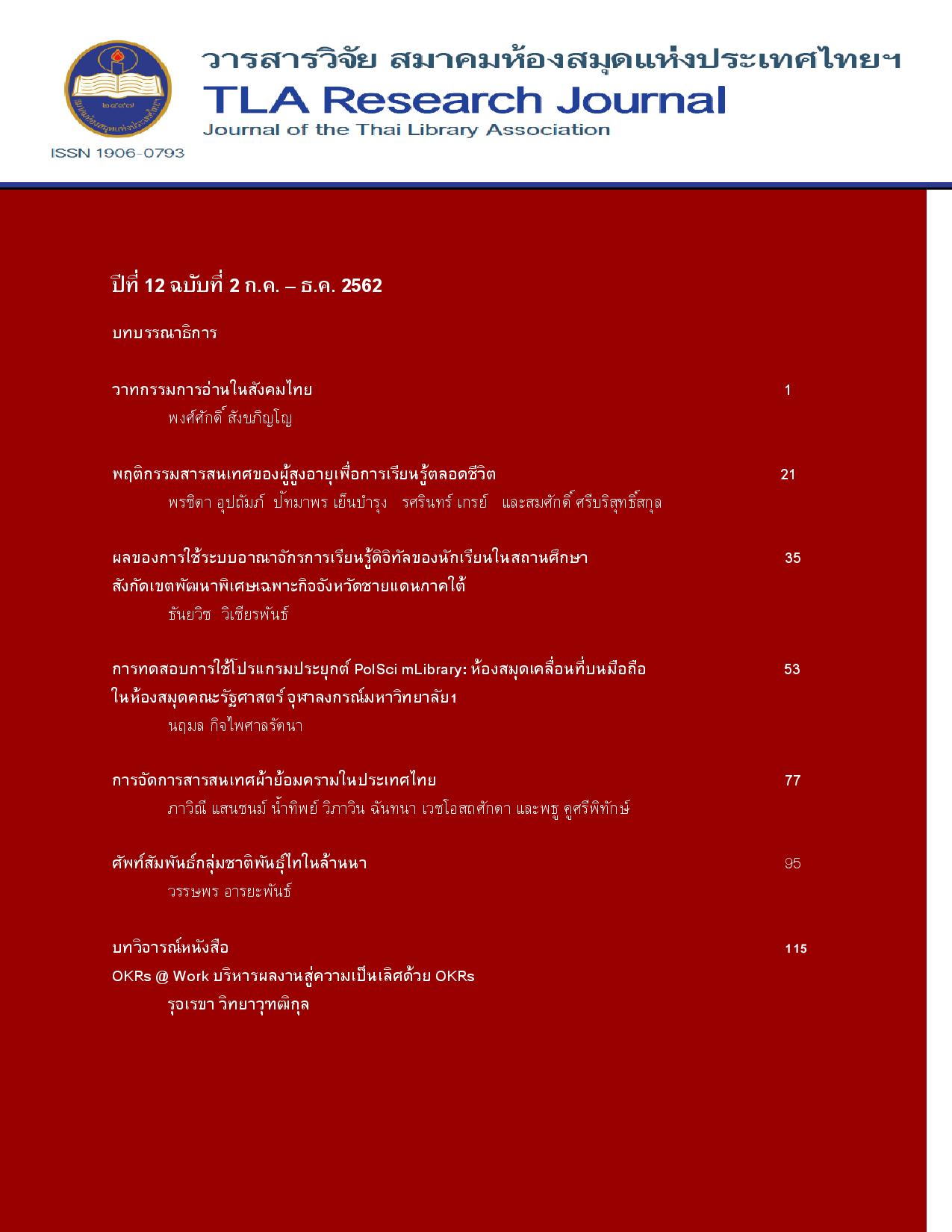Information Behavior of Older Persons for Lifelong Learning
Main Article Content
Abstract
The purpose of this research was to study the information behavior of the older persons for lifelong learning. The methodology applied in this study was qualitative research. The data was collected by in-depth interviews. The samples consisted of 48 older persons aged at least 60 years, were selected by purposive sampling technique.
The results of this research were as follows. 1) The information for lifelong learning needed by the older persons was health information in the form of action learning. The factors causing the information needs were the older persons themselves and their environment. 2) Most of the older persons sought for information through advice of information providers, family members and friends. The information seeking channels were mass media, information service agencies and online information sources. Their obstacles of information seeking were reading and listening. 3) Most of the older persons used the information to meet their own needs, such as health problems of themselves and spouses, learning, and free time activities.
Article Details
บทความทุกเรื่องที่ลงตีพิมพ์จะได้รับการตรวจอ่านโดยผู้ทรงคุณวุฒิ ความคิดเห็นและบทความที่ปรากฏในวารสารนี้ เป็นของผู้เขียนซึ่งมิใช่เป็นความคิดเห็นของคณะผู้จัดทำ และมิใช่ความรับผิดชอบของสมาคมห้องสมุดแห่งประเทศไทยฯ การนำบทความในวารสารนี้ไปตีพิมพ์ซ้ำต้องได้รับอนุญาตจากคณะผู้จัดทำ
All articles submitted for publication will be reviewed by the academic reviewers. The editorial board and TLA claim no responsibility for the content or opinions expressed by the authors of individual articles or columns in this journal. Reprinting of any articles in this journal must be permitted by the editorial board.
References
Bhadrashetty, A. & Maheswarappa, B.S. (2014). Health information needs, sources availability and their use by elderly people in South India: A case study of Kalagi, A Gram Panchayat in Chittapur Taluk of Gulbarga District, India. Research Journal of Library Sciences, 2(6), 7-11.
Chang, L., Basnyat, I. & Teo, D. (2014). Seeking and processing information for health decisions among elderly Chinese Singaporean women. Journal of Women & Aging, 26(3), 257–279.
Chaudhuri, S., Le, T., White, C., Thompson, H. & Demiris, G. (2013). Examining health information-seeking behaviors of older adults. Computers, Informatics, Nursing, 31(11), 547–553.
Dervin, B. (1983, May). An overview of sense-making research: Concepts, methods and results to date. In International Communication Association Annual Meeting, Dallas, Texas. Organized by International Communication Association.
Dugarova, E. (2017). Ageing, older persons and the 2030 agenda for sustainable Development. Retrieved from
Edewor, N., Ijiekhuamhen, O.P. & Emeka-ukwu, U. P. (2016). Elderly people and their information needs. Library Philosophy and Practice (e-journal). 1332. Retrieved from http://digitalcommons.unl.edu/libphilprac/1332
Eriksson-Backa, K. (2010). Elderly people, health information, and libraries: A small-scale study on seniors in a language minority. Libri: International Journal of Libraries and Information Services, 60(2), 181-194.
Farage, M.A., Miller, K.W., Ajayi, F. & Hutchins, D. (2012). Design principles to accommodate older adults. Global Journal of Health Science, 4(2), 2-25.
Fei Yue Community Services. (2012). Lifelong learning among older adults in Singapore. Singapore: Fei Yue Community Services. Retrieved from https://s3-ap-southeast-1.amazonaws.com/c3a-java-files/52d3ec9b09b2bfea918e7915dfd39f00.pdf
Foundation of Thai Gerontology Research and Development Institute. (2015). Situation of the Thai elderly 2015. Bangkok: Amarin Printing.
Gardner, P. J., Netherland, J. & Kamber, T. (2012). Getting turned on: Using ICT training to promote active ageing in New York city. The Journal of Community Informatics, 8(1), 1-16.
Harrod, M. (2011). I have to keep going: Why some older adults are using the internet for health information. Ageing International, 36(2), 283–294.
Jaikaew, K. (2014). Information need of elderly in government elderly house at Chiang Mai province. Master of Arts, Information Studies, Chiang Mai University, Thailand. [In Thai]
John, B., Agnes, B., Giuseppe, B., Fabiana, C., Attracta, C., Marina, D., … Jim, S. (2010). Getting older people involved in learning. Austria: EUBIA EU Broadening People’s Minds in Ageing. Retrieved from
http://www.bia-net.org/images/stories/eubia/pdf/eubiaguide/eubia-guide-en3.pdf
Kim, Tae-Young & Kim, Yoon-Kyoung. (2015). Elderly Korean learners' participation in English learning through lifelong education: Focusing on motivation and Demotivation. Educational Gerontology, 41(2), 120–135.
Lau, Jesús. (2006). Guidelines on information literacy for lifelong learning. Retrieved from https://www.ifla.org/files/assets/information-literacy/publications/ifla-guidelines-en.pdf
National Institute on Aging. (2007). Making your printed health materials senior friendly: Tips from the National Institute on Aging. Retrieved from https://permanent.access.gpo.gov/LPS116731/NIA-Health-Materials-TipSheet51308.pdf
Pálsdóttir, Á. (2012). Relatives as supporters of elderly peoples' information behaviour. Infornationresearch, 17(4). Retrieved from http://InformationR.net/ir/17-4/paper546.html
Rosengren, K. (2013). Elderly men’s experience of information material about Melanoma - A qualitative study. Healthcare, 1(1), 5-19.
Schultz, U., Nothwehr, F., Hanson, J., Chrisman, M. & Haines, H. (2012). A nutrition information needs survey among older adults: Application of adult learning principles. Quality in Ageing and Older Adults, 13(2), 145-153.
Theis, S., Schäfer, D., Bröhl, C., Schäfer, K., Rasche, P., Wille, M., ... Mertens, A. (2019). Predicting technology usage by health information need of older adults: Implications for eHealth technology. Work, 62(3), 443-457.
United Nations. (2017). World Population Ageing 2017. Retrieved from https://www.un.org/en/development/desa/population/theme/ageing/WPA2017.asp
United Nations. (2002). Political Declaration and Madrid International Plan of Action on Ageing. Second World Assembly on Ageing, Madrid, Spain 8–12 April. Retrieved from https://www.un.org/esa/socdev/documents/ageing/MIPAA/political-declaration-en.pdf
Wilson, T.D. (1999). Models in information behaviour research. Journal of Documentation, 55(3), 249-270.
Wong, Y. C., Chen, H., Lee, V. W., Fung, J. Y. & Law, C. K. (2014). Empowerment of senior citizens via the learning of information and communication technology. Ageing International. 39(2), 144-162.
World Health Organization. (2002). Active Aging: A policy framework. Geneva: World Health Organization.
Zou, C. & Zhou, P. (2014). Analyzing information needs of elderly people: A survey in Chinese rural community. Open Journal of Social Sciences, 2(9), 109-115.


